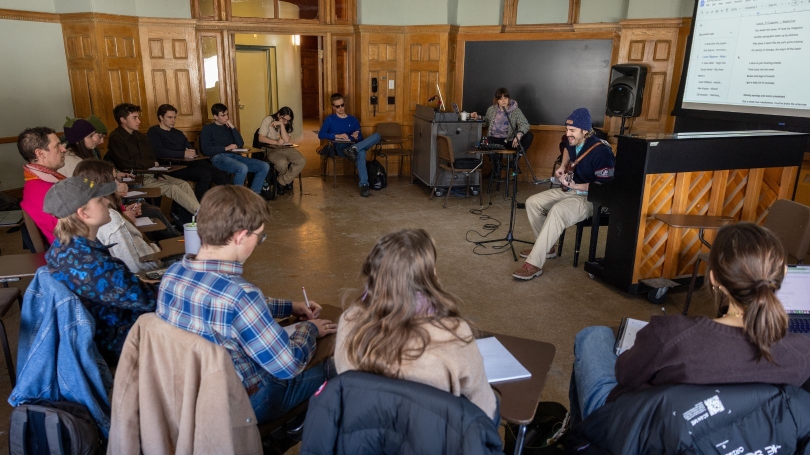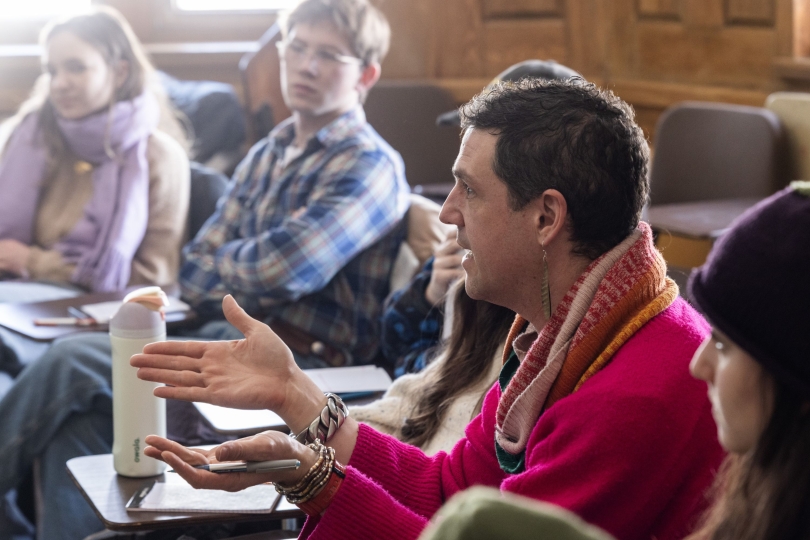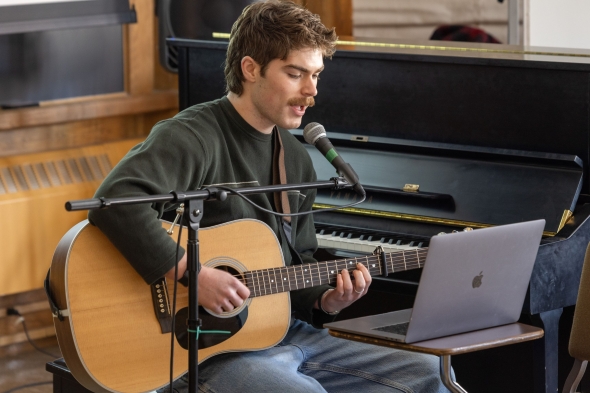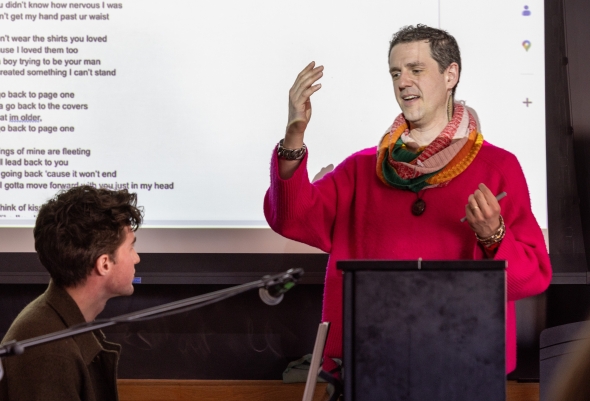

Students in César Alvarez's songwriting class explore the creative and ethical implications of AI-generated music.
From computer-generated orchestration to vocals, students this winter got a first-hand glimpse at how AI will shape the future of the music industry.
As part of Songwriting 1, Assistant Professor of Music César Alvarez invited students to write a song using the AI software of their choice.
"As songwriters, many of us are thinking, 'If AI is going to write songs, what's our job going to be?'" says Alvarez, an award-winning composer and lyricist who released their debut solo album in May. "I always try to use my classroom as a space to tackle the questions that are most urgent for me in my creative process because I'm inevitably blown away by what my students come up with. I thought, 'Rather than cower from this technology, why not see what it's actually doing around my own practice?'"
While the use of AI was encouraged, Alvarez did not require it.
"A lot of my students are very new to songwriting," Alvarez says. "I wanted to encourage them to think about AI, but I did not want to force them to use a technology that they felt was going to invade their creative process."
The results ranged from original heartfelt songs about life and love to outlandish tunes inspired by source material such as the 2007 animated film Bee Movie.

Most students chose to use ChatGPT or Suno AI. Alvarez was surprised by the myriad ways students utilized the programs.
"Some of them used AI to generate chord changes—which I think is a smart use of the technology," Alvarez says. "Chord changes are a shared territory for musicians; it's not something that you can copyright. It was very interesting to see AI talk to the students about chord relationships."
Others used AI for assistance with writing lyrics.
"I think writing lyrics is actually really hard for AI," Alvarez says. "Poetry and lyric writing bend language to share the singular experience of being. AI can get the play on words, the rhyming, and even in some cases, the metaphorical storytelling. But there's something else happening in songwriting which is intrinsically connected to whatever consciousness is inciting the song."
The students who used Suno were able to create fully produced songs complete with orchestration, mixes, and even AI-generated vocal tracks.
"That kind of blew my mind," Alvarez says. "Part of what AI does is identify formulas and then mutate them. It's changing the economy around these sonic formulas which have been guarded by large studios—who have the resources to execute a certain sound. Now, anyone can sound like a really expensive recording studio because AI can imitate it with uncanny accuracy."
Kris Garcia '28, who used Suno, was also shocked by the program's ability to accurately mimic specific genres of music.
"The class reached a consensus that Suno had pretty much replicated a certain genre of music," Garcia says. "This frightened me a bit; if AI could create this response from us, what other genres could be automated and replaced in the future?"

For many students, the assignment forced them to grapple with the ethical implications of automating a creative practice.
"Most of us, including myself, saw the use of AI as part of our music creation process as incredibly morally wrong," Garcia says. "Such technology shouldn't have such creative control over a very personal and subjective art form."
A few students elected not to use AI at all, while others experimented with AI before ultimately abandoning the technology. Alvarez views both choices as valid responses to the assignment and valuable learning experiences.
"I thought that was a real success, because that's another part of the songwriting practice: You encounter tools, and then you have to identify whether or not they are helping you find your vision and if they're worth the investment of time to use," Alvarez says.
Others, like Garcia, chose to have AI generate their entire song.
"I decided to push AI to its limit," Garcia says. "I filled out Suno's prompt with the numbers 1 to 70—no words or instructions, just purely the numbers. If AI is really going to attempt to replace creativity, I wanted to test whether it can handle absurdity. The result proved it can: The song had a great EDM feel with absurdist lyrics—to the point that we were making fun of it in class."
With AI becoming more accessible, the class discussed how the technology will transform both individual musicianship and the industry as a whole.
"As someone who wishes to compose in the future, I began to question my job security," Garcia says. "Our professor mentioned that, if AI continues to improve, the music that will be most prized in the future will be low-quality, at-home demo tracks rather than the high-quality, million-dollar studio songs we commonly hear."

"I'm viewing this technology as a collaborator in the same way that I would view a saxophone: It's a piece of technology which is going to enable you to create sounds you wouldn't otherwise be able to create," Alvarez says. "Imagination is the last thing for AI to be able to imitate. It's already imitating it really well—but until it has its own authentic experiences or point of view, it is still an imitation, and it will only be playing at a practice that many of us spend a lifetime trying to understand."
Ultimately, Alvarez hopes the AI assignment will inspire students to keep creating songs that reflect their personal experiences and emotions, while allowing them to shed some of the intimidation and anxiety around the emergence of the technology.
"With the advent of AI, it feels very clear to me that the realm of art, creativity, and human expression is truly one of the most durable practices," Alvarez says. "Part of what I'm trying to communicate to my students is how valuable their creative expression actually is. Ritual togetherness—which is how I talk about live performance—is an essential part of what it means to be human."